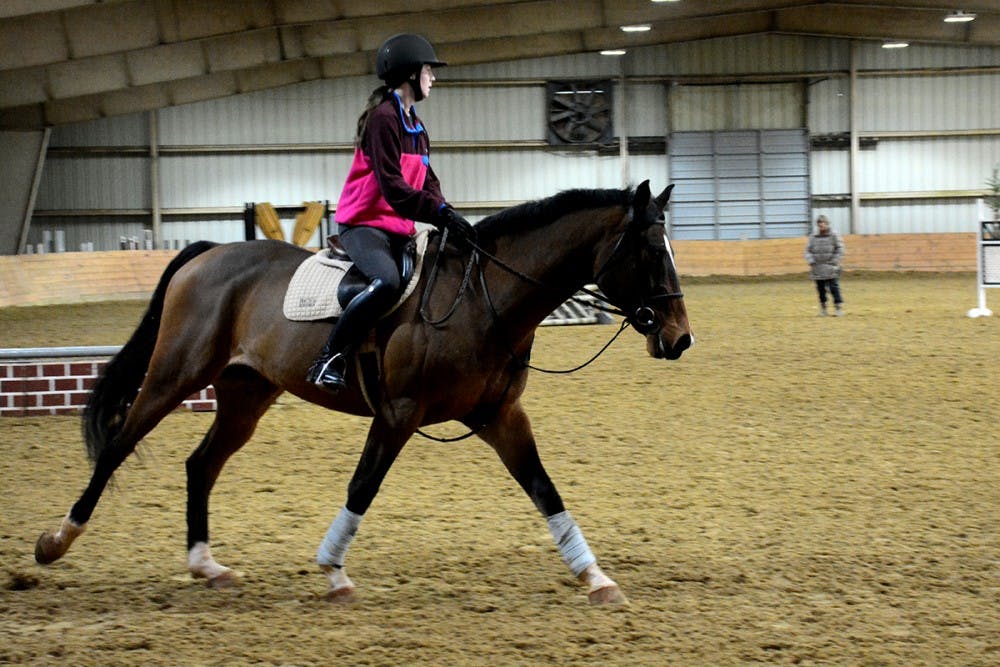Founded in 1976, the Virginia Riding Team is a club sports team open to University students of all years with an interest in riding horses. With 65 riders, 4 coaches and over 30 team horses, the team is a competitive force that has accumulated numerous accolades over the years, including the 2018 American National Riding Commission Novice Championship title and has qualified for 10 American National Riding Commission Championships.
As a co-ed club organization, the Virginia Riding Team welcomes riders of a wide variety of experience levels.
“Most riders on our team would come in with some form of experience,” Coach Laurie Turner said. “We probably get one or two a year that have no experience whatsoever.”
Additionally, over the last five years, the team has experienced immense growth in membership — a trend that appears to be continuing. Turner said the class of first-years that entered the University in the fall of 2018 was one of Virginia Riding’s larger incoming classes.
“This year was a big year for us,” Turner said. “I think… it was about 20-ish [new members], which is high.”
When joining the team, students pay a $175 club fee and can choose to purchase either the one-lesson-a-week package, which costs $1100 per semester, or the two-lesson-a-week package, which costs $1800 per semester. The vast majority of students who join the team already own riding equipment, while beginner riders either borrow or purchase their own equipment, which can vary in pricing.
The team trains at The Barracks Farm, a private farm owned by Coach Claiborne Bishop and her husband. Located about six miles from central Grounds, the Barracks is complete with a full riding arena, a large outdoor jump course and 60 acres of fenced paddocks. Team members typically practice at the Barracks twice a week but are free to go out and ride up to seven days a week with an instructor’s approval.
According to second-year College student Jason Mabry, a typical riding lesson entails almost as much horse care and grooming as it does actual riding, and members must arrive about a half hour early to prepare the horses.
“You get your bridle … and then go to the stall, pick [the horse’s] feet, take it out … brush it and then tack up,” Mabry said. “And then after [the lesson] we wash all of the horses’ legs off … sponge them down, brush them off, make sure there are no saddle marks. And then we have to put them away [and] make sure they’re cooled down so they don’t colic.”
The club’s president, fourth-year College student Caroline Powell, said her duties involve her in virtually all of the team’s activities.
“I’m a liaison between the coaches and the team as a whole,” Powell said. “I help the coaches with scheduling, members if they have any problems with life in general or on the team … I make sure I’m a little bit involved in every aspect.”
Though stressful and time consuming, Powell said her role gives her a unique and valuable perspective on the team.
“All of us have a really great opportunity to ride a bunch of horses and to get to know each other, but as president, I have more of a chance to be out there and see everybody … growing and … have a really lasting connection to everyone,” Powell said.
In contrast with the all-encompassing role of the president, the club’s captains spearhead team participation in competitions, called horse shows. Virginia Riding competes in Zone Four Region Two of the Intercollegiate Horse Show Association. Of the team’s roughly 65 members, about 15 typically represent the University in shows.
“As a captain, I’m in charge of … the forms for the horse shows,” said Zoe Lewczak, second-year College student and team co-captain. “So I go to the college registrar every week before a horse show and make sure everyone’s in good academic standing.”
Virginia Riding also hosts shows at the Barracks during the academic year, a massive undertaking for the captains and the rest of the team’s leadership.
“We have to order the ribbons, we have to confirm the judge, confirm the concessions,” Lewczak said. “We have to make sure our prize list and entry blanks are sent out. We have to make sure the other schools register their riders … It’s a very big process, and it takes at least a month to plan.”
Still, for all the pressure and prestige of these high-level competitions, Lewczak emphasized that the rewards of being a Virginia Riding member also come, in large part, from the more mundane bonding activities the team does regularly. These include pasta dinners, movie nights and mixers with other teams such as Club Golf and Rowing.
Activities like these help in cultivating the familial bond that, for coaches and members alike, lies at the core of the Virginia Riding Team. According to Turner, despite the many differences in home states, academic interests and riding experience among the team, the members’ shared interest in horses allows them to form lasting, meaningful relationships.
“It’s just a great group of friends that happen to have horses as the common bond that brought them together,” Turner said. “[When] prospective students come and tour the barn, they ask what is the best part of Virginia Riding. If I have other students nearby ... every single time they say the best part is the people.”







